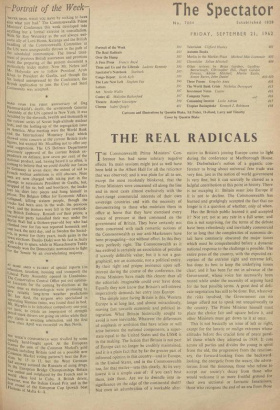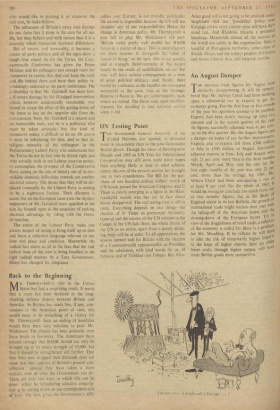THE REAL RADICALS
HE Commonwealth Prime Ministers' Con- ference has had some salutary negative effects. Its main sessions might just as well have been held in the Albert Hall for all the reticence that was observed; and it was plain for all to see, except the most resolutely blinkered, that the Prime Ministers were concerned all along the line and in most cases almost exclusively with the short-range commercial interests of their own sovereign countries and with the necessity of demonstrating to those who maintain them in office at home that they have exercised every ounce of pressure at their command on the government of Britain. They have certainly not been concerned with such romantic notions of the Commonwealth as our anti-Marketeers have been propagating—not without effect. In this they were perfectly right. The Commonwealth as it has evolved is certainly an association of peculiar if scarcely definable value; but it is not a geo- graphical, nor an economic, nor a political entity. By their right and proper insistence upon self- interest during the course of the conference, the Prime Ministers have made this clearer than all the editorials imaginable could ever have done. Equally they now know that Britain's self-interest imperatively demands her entry into Europe.
The simple issue facing Britain is this. Western Europe is at long last, and almost miraculously, moving fast towards economic and political in- tegration. What Britain historically sought to avoid is now inevitable. Whatever the differences of emphasis or ambition that have arisen or will arise between the national components, a super- state equal to the United States and the USSR is in the making. The fiction that Britain is not part of Europe can no longer be credibly maintained, and it is a plain fact that by far the greater part of informed opinion in this country—and in Europe, in the United States, and in the Commonwealth too, for that matter--sees this clearly. At its very lowest it is a simple case of: if you can't beat them, join them. Are we to dwindle into in- significance on the edge of the continental shelf'? Not even an adumbration of a workable alter-
native to Britain's joining Europe came to light during the conference at Marlborough House. Mr. Diefenbaker's notion of a gigantic con- ference to bring about universal free trade was very fine, just as the notion of world government is very fine, but it can scarcely be classed as a helpful contribution at this point in history. There is no escaping it: Britain must join Europe if it is not to decline. The Commonwealth has learned and grudgingly accepted the fact that no longer is it a question of whether, only of when.
Has the British public learned it and accepted it? Not yet; not at any rate in a full sense; and this is not surprising, for the terms of the debate have been relentlessly and inevitably commercial for so long that the complexities of economic de- tail have constantly obscured the major issues which must be comprehended before a dynamic national response to the challenge is possible. The entire press of the country, with the expected ex- ception of the extreme right and extreme left, has done its best to keep the underlying issues clear; and it has been far out in advance of the Government, whose voice has necessarily been muted while under the necessity of arguing hard for the best possible terms. A great deal of deli- cate negotiation has still to be done. But, whatever the risks involved, the Government can no longer afford not to speak out unequivocally to the country. The Prime Minister himself must place the choice fair and square before it, and other Ministers must get down to it at once.
This is not basically an issue of left or right, except for the lunatic or malign extremes whose attitudes before this crucial time of peace paral- lel those which they adopted in 1939. It cuts across all parties and divides the young in spirit from the old, the progressive from the reaction- ary, the forward-looking from the backward- looking, the energetic from the weary, the adven- turous from the timorous, those who refuse to accept our society's decay from those who would welcome it as more fruitful ground for their own sectional or fantastic fanaticisms, those who recognise the end of an era from those who would like to prolong it, at whatever the real cost, in make-believe, The advocates of Britain's entry into Europe do not claim that it alone is the cure for all our ills, but they believe and with reason that it is a necessity which transcends factional differences.
But of course, and inexorably, it becomes a matter of party politics, and all the signs show a rough time ahead. As for the Tories, the Com- monwealth Conference has given the Prime Minister and his colleagues just enough room for manceuvre to ensure that they can keep the rank and file behind them and have their policy re- soundingly endorsed at the party conference. The r obability is that Mr. Gaitskell has done him- s:If severe damage by his ill-judged intervention. which, however academically reasonable, was hound to create the effect of his getting down off the fence at last on the opposite side from the Government. Now, Mr. Gaitskell is a sincere and an honourable man, and he is a politician who must be taken seriously; but this kind of manoeuvre makes it difficult to do so. Of course it must be infuriating for him, and to that in- telligent minority of his colleagues in the Parliamentary Labour Party who understand that the Tories do not in fact rule by divine right and who actually wish to see Labour exercise power. to contemplate the prospect of the Conservative Party sailing on the tide of history out of its for- midable domestic difficulties towards yet another electoral victory. The threat that they will be dis- placed eventually by the Liberal Party is ceasing to be a nightmare fantasy. Their dilemma is acute, but on the European issue even the loyalest supporters of Mr. Gaitskell were appalled to see him lay himself open to the suspicion of seeking electoral advantage by siding with the forces of reaction.
The antics of the Labour Party make one almost despair of seeing it bring itself up to date and learn a reformist language relevant to our time and place and condition. Meanwhile the radical fact stares us all in the face that the real radical issue of the time is being handled in the right radical manlier by a Tory Government. Blimp has changed his allegiance.











































 Previous page
Previous page